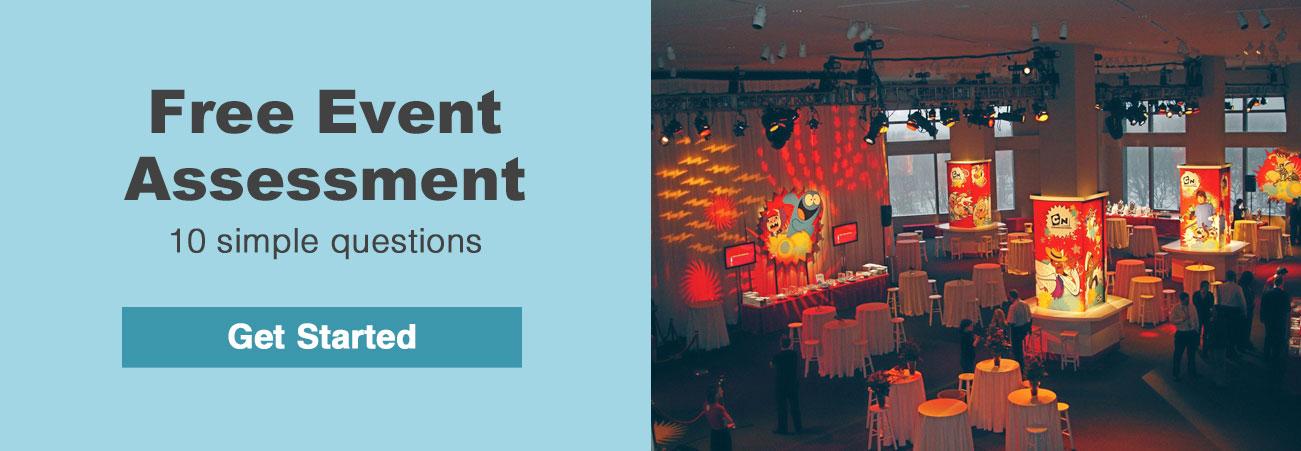
Do you have an upcoming event for which you’re considering hiring an event planner? Perhaps you’re looking for a new job in the event planning field. Or, maybe you’re just the curious type. We don’t blame you. We’ve been asked time and time again, “what does an event planner do”?
An event planner could be a full-time employee of a company, or a third party person who is contracted by a company or individual for special occasions. In either case, event management is typically their sole responsibility.
For an event of significant size, be it a party or a corporate function, it is generally unwise to have a non-event planner doing all of the planning. Oftentimes, companies make the mistake of tasking an event to an employee who already has a full-time job. In this instance, not only does his or her role with the company suffer, the event does not run as smoothly because his or her time has been split. Plus, he or she does not typically have the skills or experience to run an event of that size without incident.
Similarly, individuals planning large private functions often underestimate the work involved, and regret not employing the services of an event planner. That said, an event planner could perform all functions of an event from A to Z. Or, they could help fill in the gaps where an existing planner is feeling a bit behind the curve.
Event Design
-
Venue | The selection and reservation of your event venue is as important a decision as any. Your location may differ based on the nature of your event, and could be a hotel, convention hall, outdoor venue, restaurant or private home.
-
Themes & Decor | Frankly speaking, some people are creative types, and others simply aren’t. Every event requires some level of creativity, even something as straightforward as a business meeting or luncheon. An event designer will be able to assess the type and degree of decor needed, as well as themes and visuals to keep attendees’ interests sparked.
-
Entertainment & Speakers | Keeping your guests entertained is often one of the primary goals (if not the only goal) of an event. Sometimes the event is centered around something like a guest speaker, and other times, planners need to come up with the appropriate entertainment for the type of event. This is where a planner’s experience will come into play, as they can tap into their library of resources to find the right fit for you and your guests.
-
Food & Drinks | What and how you’ll be serving at your event is a key decision, which will dictate, and be dictated by, your budget. Food and drink is central to most events, and, honestly, is a primary reason why many people attend events. It’s also high on the list of things people will remember from your function, making it a key indicator of success. So, don’t take this category lightly. An event planner will know not only the type of cuisine to serve based on your budget, he or she can help determine quantity.
Pre-Event Planning

-
Budgeting | You would be shocked at the wide range of green an event could cost you. Whether you have a set budget you’re working within or not, it is of utmost importance to be aware of the cost of each facet of your function. Even if it’s a private party and the sky’s the limit, you really want to be aware of the budget ballpark you’re in. An event planner is a vital part of this, and will have ways and means of ensuring your event is on budget.
-
Logistics | The beauty of an event planner is that they’ve been through hundreds, maybe thousands of events. That means they have a deep understanding of what needs to happen logistically for your event to be a success. They will help you in the pre-event planning stages to determine personnel and other details needed to ensure logistical smoothness.
-
Contracts & Agreements | Large events require working with a number of different companies, so there is a fair bit of red tape to deal with. Your event planner will do the paper chasing for you, and ensure you are aware of, and have input on, the contracts and agreements.
-
Procurement | Do you need tables, chairs, a tent, linens, portable toilets, signage, etc.? What about permits? Procuring these items can be a nightmare if you aren’t prepared. An event planner can make your life easier by either dealing with vendors or rentals of these items, as well as their delivery and setup. Many event planners own these basic items, making rentals much cheaper.
-
Guest List | Your guest list might be a work-in-progress throughout the different event planning stages. Frequently, this list will get pared down as the event planning progresses and the organizers see the budget going up, up, up. Cutting people out can be a tough decision, and one that an event planner can help you weigh.
-
Advertising | Now that most of the details are planned, it’s time to get people to your event. Again, the connectedness of an event planner comes into play, as he or she is able to tap into their networks to get the word out. A planner can also help with paid advertising and marketing, as well as managing RSVPs and ticket purchases.
On-Site Management
-
Personnel | While a planner will remain involved in all aspects of your event, he or she typically has a cohort of contractors to help things run smoothly: bartenders, servers, welcome and cleanup crew, security and more. These groups of people can be hard to procure on your own, and oftentimes won’t work with just anybody off the street. The relationship your event planner has with event staff is key.
-
Transportation & Parking | Sometimes the logistics of transportation can cause the most headaches. Depending on your venue, parking could be tight. Your event planner can foresee transportation issues, and recommend and contract transportation help such as busses, limos, cars, trains (vouchers), valet parking and parking lot reservation.
-
Technical & Production | Ever attended a meetingwhere there were problems with audio, video, lighting or computers? Yeah, we all have. And there’s nothing more unprofessional. Having an event planner on board can help you save face and reduce the stress caused by the inevitable “technical difficulties”.
Post-Event Activities
-
Cleanup | So, your event is over, and it was a great success. Now, what? Time to clean up, of course. Leaving your venue in a state of disarray can not only leave the cleanup in the wrong hands, it can result in fines from your venue management company. Let your event planner take care of this detail so you can go home happy and worry-free.
-
Follow Up | The nature of your event could dictate whether there needs to be some sort of event followup, such as a survey, sending off slideshows or thank-you messages. After all the planning and preparation, once your event ends, you’re likely going to want to forget about it altogether. An event planner can take post-event responsibilities off your shoulders so that you can move on.
As you can see, an event planner does a lot, and this is just a basic list! Other functions are not uncommon for an event planner. In fact, they’re used to rolling with the punches and doing whatever it takes to help you.
As we said, planners can perform some or all of these functions, depending on your needs. Most people who are planning an event of any significant size will find it invaluable to have an experienced planner on hand to bounce ideas off of, and to fill in where needed.
An added bonus is that, the event planner shares in the accountability for your event’s success. That means, if things go awry, you don’t have to be the bad guy… which we all hate.

 Game On, Team! Unforgettable Corporate Party Games to Boost Fun and Bonding
Game On, Team! Unforgettable Corporate Party Games to Boost Fun and Bonding “Meeting in the Middle:” Remote Work from the Employer’s Perspective
“Meeting in the Middle:” Remote Work from the Employer’s Perspective Remote Connections, Tangible Results: Why Remote Work Should Be Here to Stay
Remote Connections, Tangible Results: Why Remote Work Should Be Here to Stay Event Social Media 101
Event Social Media 101 25 Best Meeting & Convention Apps
25 Best Meeting & Convention Apps 24 More Corporate Party Games
24 More Corporate Party Games Event Sponsorship Packages 101
Event Sponsorship Packages 101 Event Interaction App
Event Interaction App Venue Questionnaire
Venue Questionnaire Company Holiday Parties 101
Company Holiday Parties 101